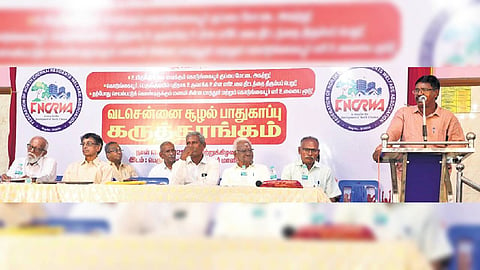

CHENNAI: Even as environmental activists and North Chennai residents against the waste-to-energy (WTE) incinerator project at Kodungaiyur, the Greater Chennai Corporation (GCC) has moved forward with it by issuing a Letter of Acceptance (LoA) to the successful bidder.
The project, which will be implemented under a 25-year Public-Private Partnership (PPP) model, will see the formation of a Special Purpose Vehicle (SPV) by the selected bidder to execute and operate the plant.
Speaking to TNIE, a senior corporation official said that, “GCC has issued LoA to the successful bidder. The bidder will form a special purpose vehicle (SPV) for the project, who has to get approvals from competent authority. CPCB and TNPCB norms will have to be adhered to by the SPV.”
The public will be “informed” about the project details then and there, the official added.
Meanwhile, nearly 10,000 people, including residents, activists, and civic groups, are expected to participate in a massive human chain protest on May 25, opposing the WTE project at Kodungaiyur and Perungudi.
The Federation of North Chennai Residents’ Welfare Association (FNCRWA), which convened a public meeting on Sunday, strongly condemned the WTE project, claiming it would turn North Chennai “toxic”.
FNCRWA president T K Shanmugam said the GCC’s proposed 1,400-tonne WTE plant at Kodungaiyur and 700-tonne plant at Perungudi threaten the health of thousands living in surrounding villages and the potential impact it will have on the environment.
Their demand also included clearing Kodungaiyur landfill and the shutting down of existing incinerators at Kodungaiyur and Manali Chinnamathur.
The GCC recently closed 168 micro composting centres and 88 material recovery centres stating that the waste will be taken to landfill to process.
Shanmugam cited a recent fact-finding report revealing that the 10-tonne incinerator at Chinnamathur, Manali, had been operating without consent from TNPCB since 2020. Residents have reported respiratory issues, skin ailments, cancer cases, and groundwater contamination, he said.
“When the GCC can’t even maintain a 10-tonne capacity incinerator with proper consent and protective measures leading to serious health and environmental risks, how can the GCC expand WTE facilities in North Chennai,” he asked.
North Chennai is home to nine of TN’s 10 petrochemical industries, five oil refineries, three fertiliser manufacturing companies, and two thermal power plants, transforming the area into a hub for chemicals and industries. He demanded the implementation of a separate environmental policy for North Chennai.
“If the government truly means ‘Vada Chennai Valarchi Thittam’, it must prioritise environmental justice — not just build community halls and bus shelters,” he added.